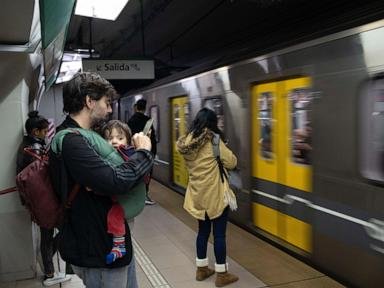Commuters in Buenos Aires are being hit by an abrupt 360% increase in subway fares
ByISABEL DEBRE Associated Press
BUENOS AIRES, Argentina — Commuters in Buenos Aires on Friday were hit by an abrupt 360% increase in subway fares, one of the most dramatic price hikes in libertarian President Javier Milei ‘s harsh budget austerity campaign in Argentina.
After weeks of hearings, a judge on Thursday lifted an order that had temporarily blocked the scheduled increase in subway fares. That cleared the way for the change to take effect Friday morning as office workers across Buenos Aires streamed through the turnstiles of South America’s oldest subway system.
Public transportation fares are a sensitive issue across Latin America, where inequality is deeply entrenched and outrage triggered by subway price hikes have sparked social unrest in the past, such as Chile’s 2019 mass protests.
Overnight, the price of a single ride in Buenos Aires more than tripled from 125 pesos (14 cents) to 574 pesos (64 cents), exacerbating a painful cost of living crisis in Argentina. Some commuters complained they were suddenly paying triple for a network that was only deteriorating.
“It obviously affects me because it means more money disappears from my salary every day, but the worst part about it is that there is zero investment in the service,” said 35-year-old Sofía Acosta. “We commute in terrible conditions, cramped, delayed, and now we are paying more.”
Milei is slashing public spending on everything from subsidies to state companies as part of a radical free-market experiment aimed at rebuilding Argentina’s credibility with foreign investors and taming hyperinflation.
But at least in the short term, his deregulation and austerity measures have pushed up inflation — now at 289% annually, among the highest rates in the world — and made life harder for ordinary Argentines as the economy slips into recession.
It’s the third time this year that inflationary spikes hit subway fares — just 80 pesos last December — as Milei cuts federal subsidies for public transportation, forcing city governments to raise costs. Prices for buses and trains in the sprawling city of Buenos Aires have also risen steadily, although not in a one-time price bump as with the subway, which is known as Subte.
Municipal officials in Buenos Aires said fares would reach 650 pesos (73 cents) on June 1, but that they would delay until Aug. 1 another price increase to 757 pesos, “with the aim of minimizing the impact on riders’ pockets.”
Low fares have long been a boon for residents, especially those priced out of central Buenos Aires who commute long distances to work. But the cheap fares — like other subsidies for basic commodities — also constitute a large and growing cost that the heavily indebted government says it can’t afford in the midst of Argentina’s worst financial crisis in two decades.
The Buenos Aires underground transit system — one of the first to be built in the world — was once a poignant symbol of the city’s lavish early 20th-century wealth. But in recent decades it has fallen into disrepair.
